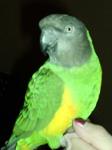
| Amazon Expedition Travel
|
 |
|
|
|

| User Functions
|
|
|
Don't have an account yet? Sign up as a New User
|
|

| Help support this site!
|
|
|
Help support this site... your donations are needed to support research, conservation, and rescue efforts.
|
|

|
 |
| Illegal Parrot Traders Beware |
 |
Wednesday, February 15 2006 @ 11:01 AM UTC
Contributed by: roelantjonker
Views: 11338
|
 New Era (Windhoek) Namibia. February 14, 2006
New Era (Windhoek) Namibia. February 14, 2006
 Conservationists and bird lovers want to go into cooperation with the Protected Resources Unit to clean up the illegal trade in parrots. Conservationists and bird lovers want to go into cooperation with the Protected Resources Unit to clean up the illegal trade in parrots.
While the Grey Headed parrot is under tremendous pressure at the moment, due to an increased illegal capture and trade, another species which is endemic to Namibia, the Ruppel's Parrot went out in thousands some 10 to 12 years ago.
Studies indicate that between 600 and 1 000 Ruppel's birds that are near endemic to Namibia, are illegally smuggled out of Namibia every year.
The survival rate of these birds is however low because of the bad conditions and transportation, which sees 70 to 80 percent of the smuggled birds die in transit.
Ruppel's Parrots only occur in Namibia and Angola and it is estimated that their population is about 10 000.
This illegal trade in the birds that are exported to South Africa and other European markets is considered one of the biggest threats to the species' population in the country.
Patrick Lane, Chef Control Warden for Southern Regions told New Era on Friday that there was need for collaboration with the protected resources unit to outlaw this trade.
A pair of Grey Headed Parrots that are bred in captivity fetch N$10 000, while the illegal ones fetch between N$3 000 and N$4 000 each.
The trade involves a seller, middlemen and bird keepers. While some of the birds may end in people's homes in Windhoek, others are exported to South Africa, he said.
According to the country's laws, if one cannot prove that the bird comes from a legal source, they can be prosecuted.
But even though the country has had many cases of this illegal business, no one has yet been prosecuted. In September 2005, 74 Ruppel's were confiscated from a smuggler near Onhelewa at the Namibian-Angolan border. The smuggler evaded arrest and fled back into Angola.
After they were taken for rehabilitation at the Namibia Animal Rehabilitation Research and Education Centre (Narrec) for a month, during which they were treated for injuries and malnutrition they had suffered, 66 of them were released back into the wild.
Apart from this case, there have been many other cases, which saw no one being prosecuted for illegal capture of parrots.
In 1996, there was a case of illegal capture involving 30 Mayor's Parrots in the Okahandja area, while in 2004, some Grey Headed Parrots were confiscated at the port with no permit and no rings.
Other cases involve someone who brought eight parrots from the Democratic Republic of the Congo and brought them all the way to the University of Namibia, where they were confiscated.
Other unwanted activities involving parrots include breeding mutated colours of parrots. According to Liz Kommen of Narrec, end last year around the Swakop River area, some breeder released mutated parrots which when bred with the others can cause genetic mutations.
Although some people buy parrots that are on sale because they feel for the birds, Lane said this fuels the trade.
Some of the things that threaten both the Grey Headed and Ruppel's parrots apart from illegal capture for the cage bird trade, are illegal capture for consumption by people and also habitat loss from deforestation causing food shortages and lack of roosting and nesting sites.
Kommen said in order to root out such practices, there is need to start an awareness campaign for people to get to know the country's resources.
"We need to consider how much of the legislation governing wildlife is given to the people," she added.
The law states that a permit is needed from the Ministry of Environment and Tourism to capture, keep or kill any wild animal.
The law also says that no person shall capture, transport or keep any other wild animal for commercial purposes unless he is licensed as a game dealer.
According to Narrec, indigenous (naturally occurring in Namibia) birds can only be exported if they have been bred in captivity and birds and ring numbers will be checked before an export permit is issued.
Namibia is home to five of the nine parrot species that are found in Southern Africa, namely: Grey Headed Parrot, Meyer's Parrot, Ruppel's Parrot, Rosy-faced Lovebird and the Black-cheeked Lovebird.
Wezi Tjaronda
http://allafrica.com/stories/200602140286.html
|
|
|
|

|

|

